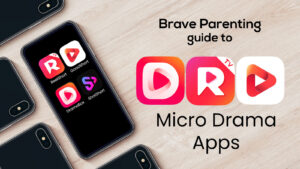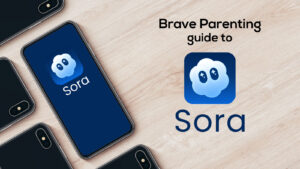You probably think your teen spends too much time on their phone.
A majority of parents (72%) feel this way according to new research.[1]
And…over half of teens (52%) AGREE they spend too much time on their smartphone.
Your child probably thinks YOU spend too much time on your phone.
Over half of teens (51%) surveyed by Pew Research reported they often or sometimes feel their parent/caregiver is distracted by their phone.
Now…the question is: do YOU agree?
According to the research, only around a third of parents (36%) actually agreed.
It is interesting how easy we place judgment on our teen’s usage without humbly looking at our own.
OUR MEDIA USE
The average American parent spends 9 hours on a device. It is easy to justify those hours as “work”. Unfortunately, the survey also revealed 82 percent of those 9 hours (almost 8 hours) is spent on personal screen media. Shockingly, over half of parents spend those 8 hours of media for personal entertainment.[2] Watching TV, social networking, and video gaming are just a few personal entertainment outlets.
A quick 20 minutes to scroll through your Twitter news feed. Another 30 minutes on Facebook seeing what is new, novel, or funny. A few texts. Editing and posting some pictures on Instagram. Back to Facebook to respond to comments left on your post. One episode on Netflix (only one, you tell yourself). Back to Instagram to see who liked your recent picture. Check email. Accept new connection requests on LinkedIn. Back to Instagram one last time.
As parents, we may try to justify our 8 hours of personal entertainment with “we are adults”. Somewhere in this new model for “adulting” we’ve failed to devote much time to our children.
Catherine Steiner-Adair, Ed.D., author of The Big Disconnect: Protecting Childhood and Family Relationships in the Digital Age says this, “Where it becomes worrisome is when parents are pulling away from family life, lost in their smartphones and screens, leaving kids feeling neglected and lonely.” [3]
OUR MEDIA’S EFFECT
Our children absorb every way we engage with media. Perhaps, like our teens, we have become poor time managers on our devices. Certainly, none of us would admit that we are neglecting our children. After all, neglect is a serious accusation.
Let’s look at some definitions of neglect:
Merriam Webster:
- to give little attention or respect to
Dictionary.com
- to be remiss in the care or treatment of
Childwelfare.gov (neglect and abuse)
- Any recent act or failure to act on the part of a parent or caretaker which results in death, serious physical or emotional harm, sexual abuse or exploitation
One recent study published in Developmental Science looked at the effects of mothers phone use. It concluded “Like other forms of maternal withdrawal and unresponsiveness, mobile-device use can have a negative impact on infant social-emotional functioning and parent-child interactions.”[5]
Remiss in the care of our infants?
Another large study asked children ages 8 to 13 about their parent’s phone use. Thirty-two percent reported feeling “unimportant” or that they had to compete with technology for their parent’s attention. [6]
Giving little attention or respect to?
As painful as it is to self-reflect in this way, we must. As childwelfare.gov sees it, if our failure to act (that is: limiting our media consumption) results in serious emotional harm, we would be considered neglectful parents.
Dr. Jonice Webb says this of emotional neglect: [7]
Emotional neglect is, in some ways, the opposite of mistreatment and abuse. Whereas mistreatment and abuse are parental acts, emotional neglect is a parent’s failure to act….because it’s an act of omission, it’s not visible, noticeable or memorable.
Are you failing to act or failing to engage with anyone other than your phone? How would your children respond to this question?
Maybe, you should ask them.
OUR RESPONSE
Here are a few brave ways to help you neglect your phone in order to be more present with your children.
- Delete Social Media apps from your phone.
- Delete any other unnecessary app that tempts you to waste time (i.e. games)
- Restrict yourself to ONE hour a day for personal entertainment. Use the phone’s built in restrictions, Circle, your spouse, or a friend to hold you accountable.
- Use a real alarm clock. Start your day off with your own thoughts instead of feeds of information.
- Use a paper calendar. Or any other old-school productivity resource as a way to decrease the temptation to become distracted.
- Turn off Notifications.
- Disable biometrics (thumbprint/facial recognition) in order to inconvenience you when opening.
- Shut your phone off (like, completely) for 1-2 hours in the evening to ensure freedom from digital distractions.
- Take less pictures in order to make more memories.
- Use the extra free time to play, engage and interact with your children.
Whether you spend two hours or eight hours of screen time due to poor time management, addiction, or laziness – something (or someone) stands neglected during these hours. It’s time for this to change.
Neglect your phone, not your children.












